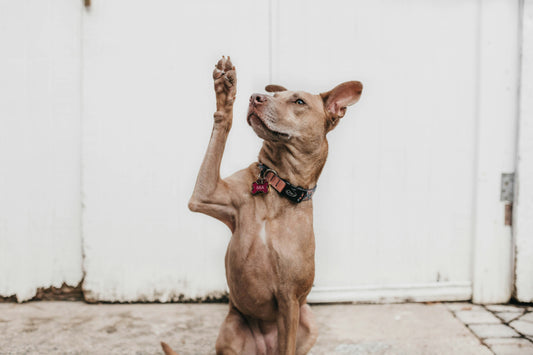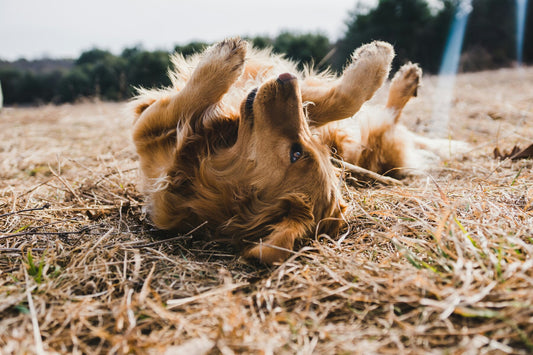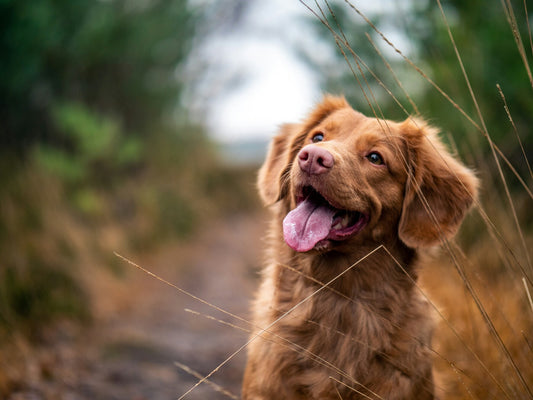How to Stop Dog Diarrhea: 9 Home Remedies

Your dog’s poop is an important indicator of his overall health. If your dog has diarrhea issues, it’s not just the mess that’s a problem; it is his health that’s on the line too. Diarrhea can be a sign of anything from a minor dietary problem to a serious health issue.
In this article, we will walk you through home remedies to help manage and treat diarrhea. Whether you’re dealing with a one-time incident or a recurring problem, these strategies can offer relief and comfort to your furry friend.
Understanding Dog Diarrhea
Diarrhea is a sign that something is wrong with your dog’s digestive system. It can stem from various causes, including dietary changes, ingestion of inappropriate items, infections, chronic conditions like inflammatory bowel disease, and even stress. Recognizing the root cause is crucial for effective treatment.
Immediate veterinary care is necessary if your dog suffers from acute diarrhea and experiences other symptoms such as vomiting, lethargy, or blood in the stool, or if it persists for more than a couple of days. Chronic diarrhea can lead to dehydration and other serious complications, emphasizing the importance of professional guidance in these situations.
Home Remedies for Dog Diarrhea
1. Fasting
One of the first steps in addressing dog diarrhea is to let your dog’s digestive system rest through fasting. Withholding food for 12-24 hours can help clear out the cause of the upset and give the intestines a chance to recover. However, it’s vital to ensure your dog stays hydrated during this time. Offer plenty of fresh water and monitor your dog to ensure they’re drinking enough.
2. Keep Them on a Bland Diet
After the fasting period, slowly reintroduce food with a bland diet. This diet includes easily digestible foods like boiled chicken or turkey (without skin), white fish, and plain white rice or sweet potatoes. These foods are gentle on the stomach and can help firm up your dog’s stool. Start with small, frequent meals, gradually increasing the portion size as your dog’s digestive system stabilizes. Over a few days, you can begin to mix in your dog’s regular food, transitioning back to their normal diet.
A bland diet serves as a bridge back to normalcy for your dog’s digestive system, providing the nutrients needed without overloading the system. Remember, the key is a gradual reintroduction to their regular diet to avoid further digestive upset.
3. Pumpkin
Pumpkin is a well-known home remedy for dog diarrhea due to its high fiber content. The soluble fiber in plain, canned pumpkin (not the pie filling variety) helps absorb excess water in the digestive tract, which can firm up your dog’s stool. Additionally, pumpkin is rich in nutrients that support overall digestive health.
For small dogs, a teaspoon of pumpkin mixed into their food is sufficient, while larger dogs can have a tablespoon. This natural remedy is not only effective but also safe for most dogs when used in moderation. Plus, many dogs enjoy the taste of pumpkin, making it easier to administer.
4. Probiotics and Plain Yogurt
Introducing probiotics into your dog’s diet can help restore the natural balance of bacteria in the gut, which is often disrupted during episodes of diarrhea. Probiotics are available in various forms, including supplements like the Digestive Care Soft Chew supplements from Bando. They can also be found in specially formulated dog foods that contain these beneficial bacteria.
Plain, unsweetened yogurt is another source of natural probiotics. Adding a small amount to your dog’s food can provide similar benefits. However, it’s important to ensure that your dog is not lactose intolerant before introducing yogurt into their diet. Start with a small amount to see how your dog reacts.
Both probiotics and plain yogurt can aid in quickly restoring your dog’s digestive health, reducing the duration of diarrhea episodes. They are also useful as preventive measures to maintain gut health and prevent future occurrences of diarrhea.
5. Hydration
Keeping your dog well-hydrated is crucial, especially when they are suffering from diarrhea. Diarrhea can lead to significant fluid loss, putting your dog at risk of dehydration. Ensure that fresh, clean water is available at all times, and encourage your dog to drink regularly.
If your dog is reluctant to drink water, consider adding a small amount of chicken or beef broth to make it more appealing. The broth can stimulate their thirst, ensuring they consume enough fluids to stay hydrated. However, it’s important to use broth that is low in sodium and free from onions and garlic, which can be harmful to dogs.
Monitoring your dog’s hydration status is essential. Signs of dehydration include lethargy, dry gums, and decreased skin elasticity. If you notice any of these signs, or if your dog continues to have diarrhea for more than 24 hours, consult your veterinarian immediately.
6. Herbal Remedies
Coptis and Chamomile
Herbal remedies can offer gentle relief for dogs experiencing diarrhea. Two herbs known for their soothing digestive properties are coptis and chamomile.
- Coptis: Also known as goldthread, Coptis contains berberine, an alkaloid that can help reduce inflammation and fight bacteria. It’s particularly useful if the diarrhea is suspected to be caused by a bacterial infection. However, coptis should be used under the guidance of a veterinarian or a holistic pet practitioner, as it is potent and needs to be dosed correctly to avoid any adverse effects.
- Chamomile: Chamomile tea is renowned for its calming effects on the digestive system. It can help soothe the intestines, reduce gas, and alleviate spasms that often accompany diarrhea. To use chamomile for your dog, brew a weak tea, let it cool, and offer a small amount to your dog to drink. Alternatively, you can add a few tablespoons of cooled chamomile tea to your dog’s water bowl. As with any remedy, start with a small dose to ensure your dog tolerates it well.
These herbal remedies can be part of a broader approach to treating diarrhea, complementing dietary changes and other supportive measures. However, it’s crucial to consult with your vet before introducing any new treatment to your dog’s regimen, especially if they are on medication or have underlying health issues.
7. Rice Water
Rice water, the starchy water left over after boiling rice, is a simple yet effective remedy for diarrhea. It’s easy to digest and can help to form firmer stools by providing a source of soluble fiber. Additionally, rice water can be soothing for the digestive tract.
To prepare rice water for your dog, cook white rice in a large amount of water until the grains are soft. Strain the rice, and the remaining cloudy water is what you’ll use. Allow it to cool before offering it to your dog. You can give your dog rice water to drink directly or mix it with a bland diet to increase its appeal.
This remedy is particularly useful for mild cases of diarrhea and can be used alongside other treatments. However, if your dog’s diarrhea persists for more than a couple of days, it’s important to seek veterinary advice to rule out more serious conditions.
8. Boiled Potatoes
Boiled potatoes, when prepared without any added flavors or ingredients, can serve as a bland, digestible food option for dogs experiencing diarrhea. The key is to use skinless potatoes, as the skin can be harder for dogs to digest and may exacerbate gastrointestinal issues.
To prepare, simply boil the potatoes until they are soft, then mash them without adding milk, butter, or seasoning. Start by offering your dog small amounts of the mashed potato mixed with their regular bland diet. Potatoes provide a source of carbohydrates and can help to bulk up the stool, aiding in the management of diarrhea.
While boiled potatoes can be a helpful part of managing diarrhea, they should not replace a balanced diet. They are meant to be used temporarily until your dog’s digestive system has recovered. As with any dietary change, introduce boiled potatoes gradually to ensure they do not cause further upset.
9. Electrolyte Solutions
Dehydration can be a significant concern with diarrhea, as vital fluids and electrolytes are lost. Unflavored electrolyte solutions, similar to those used for children and adults, can help replenish these essential nutrients and prevent dehydration.
When using electrolyte solutions for your dog, it’s important to choose a product without added sugars or flavors. You can offer small amounts of the solution to your dog alongside their regular water supply. Start with a few tablespoons at a time to ensure it’s well-tolerated and does not worsen the diarrhea.
It’s crucial to monitor your dog’s intake and response to the electrolyte solution. If you notice any signs of worsening symptoms or if your dog refuses to drink the solution, discontinue its use and consult your veterinarian. Remember, while electrolyte solutions can help with hydration, they do not treat the underlying cause of diarrhea, so seeking veterinary advice is essential if your dog’s condition does not improve.
Preventive Measures
Preventing diarrhea in dogs involves a multifaceted approach that focuses on diet, healthcare, and awareness of your dog’s environment. By taking proactive steps, you can minimize the risk of digestive upset and ensure your dog remains healthy and happy.
Diet Management
A consistent, high-quality diet is crucial for maintaining your dog’s digestive health. Sudden changes in diet can upset your dog’s stomach, leading to diarrhea. When introducing new foods, do so gradually over several days to allow your dog’s digestive system to adjust. Be mindful of food allergies, which can contribute to chronic diarrhea, and choose dog foods that are free from common allergens like wheat, soy, and artificial additives. Specially formulated dog foods designed for sensitive stomachs or those with digestive care supplements can also be beneficial.
Regular Vet Check-ups
Regular veterinary check-ups are essential for early detection and management of conditions that could lead to diarrhea, such as inflammatory bowel disease or infections. Your vet can provide tailored advice based on your dog’s health history and recommend vaccinations and parasite control measures to prevent illnesses that can cause diarrhea.
Monitoring for Food Intolerances
Be vigilant about your dog’s reaction to certain foods. Food intolerances can lead to recurrent episodes of diarrhea and may require a diet adjustment. Keeping a food diary can help identify potential triggers. If you suspect your dog has a food intolerance or allergy, consult with your veterinarian. They may recommend an elimination diet to pinpoint the offending ingredient.
Environmental Awareness
Dogs are curious by nature and may ingest harmful substances or spoiled food, leading to diarrhea. Keep a close eye on your dog during walks and ensure your home environment is safe and free from accessible toxins. Stress and anxiety can also affect your dog’s digestive system, so providing a stable, calm environment is important.
By implementing these preventive measures, you can significantly reduce the likelihood of diarrhea in your dog and contribute to their overall well-being. Remember, if diarrhea does occur, understanding the cause and responding appropriately with home remedies or veterinary care is key to a quick recovery.
Schedule a Consultation with our Team for Expert Advice
If your dog’s digestive health is causing you concern, or if you’re navigating the complexities of managing diarrhea, our dedicated team is here to support you. Schedule a consultation with us, and we’ll offer personalized guidance tailored specifically to your dog’s unique health requirements.
We’re committed to assisting you in understanding the nuances of digestive health, from identifying the right dietary adjustments to implementing effective home care strategies. Our goal is to ensure your dog’s digestive system is not only functioning well but also supports their overall health and happiness.






